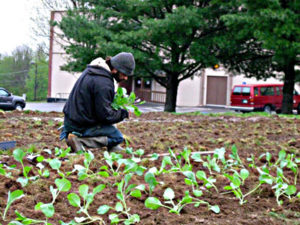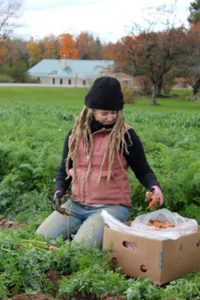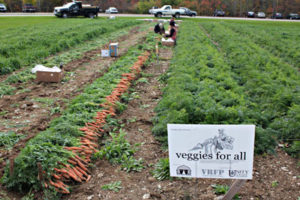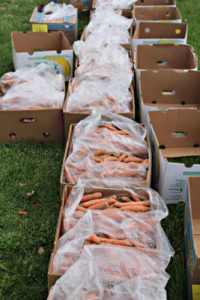 |
| Tim Libby, project manager for Veggies for All, transplants cabbage seedlings at the host site, Unity College. Jesse Pyles photo. |
By Holli Cederholm
On the third Saturday of every month, a well-traveled road in Unity, Maine, becomes obstructed with heavier than usual traffic as clients of the Volunteer Regional Food Pantry line up to receive their monthly box of food assistance. While this food pantry is unique among hunger relief agencies in its growing focus on nutritional quality, its well rounded offering of dietary staples, such as pasta, beans, canned fruits and vegetables, and dried milk, really sets it apart. The food pantry also offers clients seasonal food – organically grown, fresh-from-the-soil produce – via its collaboration with and support of a local community agriculture project called Veggies for All (VFA).
Vegetables for People in Need
In the words of Sara Trunzo, a board member of VRFP and VFA’s Food and Farm Projects coordinator, the mission of the project is “real simple: to just grow food for the food pantry.” She explains that while the food pantry offers a wide variety of food, much of its clientele still lacks access to fresh food. “People on a fixed income might not have a fruit bowl on their table,” says Trunzo.
Veggies for All, a project of the Unity Barn Raisers, seeks to fill this gap by growing quality produce organically, specifically to donate to people in need of food support in the greater Unity area. Its focus on organics is multifaceted, starting with the soil. Project manager for VFA (and MOFGA journeyperson) Tim Libby looks to soil as one of the most valuable resources for human communities. He also draws a connection between healthy produce and healthy communities. “There is a pretty remarkable link between healthy produce management and the people consuming that produce. I like to imagine a community in which all of its members are healthy and actively participating,” says Libby.
 |
| Sara Trunzo, food and farm project coordinator for Veggies for All, tops fall carrots for distribution to Unity area families through the Volunteer Regional Food Pantry. Unity College photo. |
Along with organic principles, Libby designs VFA’s annual crop plan based on vegetables that will store well, both in the field and en route to distribution. Significant crops include carrots, cabbages, winter squash, dry beans and potatoes. Trunzo explains that the alternative – planning for more-perishable crops to mature a day or two before the food pantry’s once-a-month distribution – is unreliable. “Instead we’re responding to the crop, and that works for us, because of what we’re growing. The crops last in the field, at the food pantry, in the cupboard.”
“We in large part dig enough for distribution,” says Libby. Each month the food pantry packs boxes according to the number of clients it anticipates serving, broken down by family size. Its distribution average is 275 families or 600 to 700 individuals. Throughout the season, VFA staff and volunteers use the food pantry data to determine, for example, how many row feet of potatoes to dig and wash. In 2010, VFA staggered its total donations of 15,000 pounds of fresh produce much in this manner.
Like many farmers and gardeners in northern climates, VFA also extends its harvests past the killing frost with larger plantings of its favorite storage crops for winter. Its 2010 squash harvest, with supplemental donations from area farms, fed Unity area families into this past January. While the primary goal of the project is not to feed families year-round, Trunzo said improved storage conditions – such as shared use of Unity College’s new student-built root cellar – will allow for a “slow trickle” of produce to reach clients throughout the off-season.
Veggies for All also grows smaller plantings of what many gardeners deem to be summer staples. Upon feedback from food pantry organizers, Libby has also included classic summer vegetables, such as green beans, sweet corn and melons, in the rotation. Due to their tendency to mature in flushes, these crops tend to be more challenging to coordinate with distribution dates. “That’s how we met a lot of the other food pantries,” said Trunzo. These “outlier crops” prompted VFA to connect with a handful of other soup kitchens, pantries and agencies within a 30-mile radius. “I found out that I could put 1,200 pounds of vegetables in a Honda Civic, but it’d be great not to do that,” said Trunzo.
In the future, Trunzo, whose position with VFA covers organizing distribution details and connecting with community partners, hopes to use the food pantry’s existing network with other relief agencies to avoid doing the delivery end of the distribution. “The Volunteer Regional Food Pantry is going to be the regional hub,” says Trunzo. As she sees it, VFA will be able to bring any produce to the food pantry at any point in the month, and Volunteer Regional Food Pantry organizers and volunteers will be able to channel it appropriately. “It is really incredible how volunteers at the food pantry have a pulse on who needs what.”
 |
| Carrot harvest. Jesse Pyles photo. |
When selecting which vegetables to seed, Libby and Trunzo also consider the familiarity of the vegetable. Parsnips and celeriac may hold just as well as carrots in the field, but VFA fears that its clients may not know how to cook with them, or even recognize them. To that end, VFA selects for traditional varieties, favoring orange carrots over yellow. It also publishes, in collaboration with the food pantry, a monthly educational newsletter describing how to cook with the food that is included in each distribution.
Breaking Ground
Veggies for All first formed when Libby was asked by other young farmers to join their efforts in starting a market garden. Libby, who then had several years of organic farming experience, was ready to farm independently but wasn’t interested in marketing. Libby’s background in anthropology (he holds a bachelor’s degree from the University of Maine Orono) introduced him to varying social problems, without teaching him the solutions. “I realized the best way to make a change in the world is by acting in my own community, and food is one of the most integral aspects of community,” said Libby.
Libby didn’t want to compete with other market growers – who, in a small, rural community, were likely to be his friends. At the same time he was both shocked and inspired by the issues of food insecurity challenging people in Maine. He suggested to the founding group that it donate a portion of its harvests to local hunger relief agencies, and, in effect, Veggies for All was formed.
Veggies for All applied for grants, with the Unity Barn Raisers as its fiscal sponsor, to fund what was shaping up to be a nonprofit farm project. (Veggies for All later became a project of Unity Barn Raisers.) The growers broke ground on collectively owned land in Thorndike in the spring of 2008, planting an acre of hardy storage crops, such as carrots, potatoes and cabbage, which were donated largely to the Volunteer Regional Food Pantry. “They understand the importance of food security,” said Libby.
 |
| Freshly dug carrots packed for distribution. Unity College photo. |
Since its inaugural season, VFA has re-located to Unity College and has secured two staff positions, one through the college and one through Unity Barn Raisers. The new location for VFA at Unity College offers field space and sites for permanent infrastructure (including vegetable storage, processing facilities and greenhouses). Other field plots, bringing the total area currently in cultivation up to 2 acres, are located throughout Unity on land leased from community members.
Project Sustainability
Veggies for All community partners play a huge role in the sustainability of the project, which has operated on its initial round of grant funding for the past three years. “We’ve experienced lots of cost saving through our relationships,” says Libby. Some examples include shared use of agricultural equipment with area farmers, MOFGA, and now Unity College – which recently purchased a tractor to be used, in part, by Veggies for All. Other support includes donations of seed from Fedco and of seedlings from Village Farm and from the food pantry’s director, Bob VanDeventer. Labor costs are also reduced through volunteer efforts and cooperation with Unity College classes.
Now stretching its original grant awards into the fourth season on the ground, VFA is testing new models for becoming self-sustaining. In sticking to his original vision, Libby still doesn’t want to compete with area farmers by bringing VFA produce to market or setting up a whole-sale account at the local co-op. He does, however, recognize other ways to generate income through produce sales.
From its inception VFA has been participating in the Community Farm Share Program based in Thorndike. Through this program VFA sells a few hundred dollars worth of produce annually to a local daycare. Veggies for All is working on a similar contract with Maine Farmland Trust, in which VFA will provide produce to low-income families in Unity using the CSA (Community Supported Agriculture) model with a slight twist in terms of funding: These shares are subsidized by funding from both the town of Unity and Maine Farmland Trust.
The Good Shepherd Food Bank has also awarded VFA a contract. Through its Maine Farm, Dairy and Seafood Initiative, Good Shepherd is purchasing produce from VFA to then distribute through a statewide network to hungry families throughout Maine.
However, the biggest income generator comes from within Unity Barn Raisers, which, last winter, with an undercurrent of support from Maine Farmland Trust, launched a new fundraising project for VFA using the organization’s existing Community Meals program. Typically on the first Saturday of each month, Unity Barn Raisers opens its Community Center in downtown Unity to the public, who donate on a sliding scale for a home-cooked meal shaped by seasonal produce and volunteer inspiration. The 2011 meals have featured donations from local farms, with the intent to transition to produce harvested from VFA’s fields this spring and summer. “Veggies for All product offsets costs of the meals, and the profit goes to VFA,” says Libby.
For information about VFA, see its website and blog at www.veggiesforall.org. To learn more about the Community Meals program, see www.unitybarnraisers.org.
